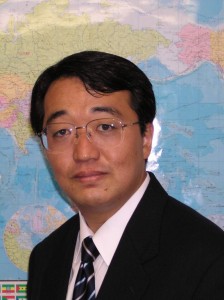緊張と統合:内村鑑三におけるキリスト教と日本の精神
このシリーズでは、私が1994年に執筆した統一神学大学院(Unification Theological Seminary)の神学課程修士論文(Divinity Thesis)を日英二か国語で掲載している。
今回から第7章の「無教会運動の評価」に入る。
7.無教会運動の評価
カルダローラが論証するように、無教会キリスト教は日本の文化とキリスト教の統合を試みた。しかしながら、内村自身が生涯を通して「日本人」と「キリスト者」という自分が持つ二つのアイデンティティーの間で葛藤したように、それは容易な仕事ではなかった。もし彼らの土着化がそれほどうまく行ったのなら、無教会キリスト教は今ごろ日本人の心を圧倒してるはずである。会員名簿や統計表が存在しないのであるから、無教会のキリスト教徒が正確に何名いるのかは誰にも分からない。しかし無教会の人々が唯一全国的レベルで集う機会である、内村の命日を記念して行われる集会に集まってくる人々の人数から推察するなら、熱心なメンバーは約1500名である。
彼らは運動の成長や会員の拡大には関心がないと主張するが、現在の信者の数では社会全体に影響を及ぼすには十分ではないように思われる。さらに常識的観点からみて、彼らの極端な反組織原理は、運動の影響力を極端に損なわせているであろう。実際、無教会運動はそれ自体が日本の社会全体の中にあっては少数派である日本のキリスト教の中においてさえ、今だに小さな少数派にとどまっているのである。
この章においては、二つの側面から無教会の意味を評価してみようと思う。一つはキリスト教と日本人の宗教的特質の間における文化的相克であり、もう一つは聖礼典の権威と個人の宗教体験の自由の間に生ずる葛藤という点である。私は二つの疑問を提示する。1)彼らは日本の文化全体とキリスト教を統合したのか? もしそうでなければ、彼らは日本の宗教伝統におけるどのような側面とキリスト教とを統合したのか? 2)宗教組織としてのキリスト教会を背景として見た時に、無教会の持つ意味とは何であるか?
A.日本の宗教的伝統における無教会の位置
私が発した最初の問に答えるために、まず日本人の価値観の構造と宗教性の主たる特徴について説明しようと思う。
ロバート・ベラは、日本の価値体系の特徴は「政治」価値の優先と個別主義にあると主張する。家庭であれ、藩であれ、あるいは日本全体であれ、人がその構成メンバーとして数えられるものは、一つの個別的な組織または集団であり、これに献身することが、真理とか正義とかに対するような普遍主義的献身よりも優先する傾向をもつのである。このような集団に対する個別主義的な結びつきは、その集団の長に対する忠誠として象徴される。日本において忠誠が非常に重要なことは、我々が第一義としている価値の具体的なあらわれなのである。
しかし部分的集団と一体化することが、全体社会と一体化することよりも優先する場合、派閥主義の重大な緊張が生ずることは明らかである。派閥主義は、近代日本においてはもちろん、徳川時代においても盛んであった。このような全体的状況は、価値体系において個別主義が普遍主義に優先する事実と密接に関連していると思われる。
VII. Evaluation of the Mukyokai Movement.
As Caldarola demonstrates, the Mukyokai Christianity attempted a synthesis of Japanese culture and Christianity. However, it was not an easy task as Uchimura himself struggled throughout his lifetime between his two identities: “Japanese” and “Christian.” If their indigenization was so successful, the Mukyokai Christianity must have overwhelmed the mind of Japanese people until now. Since there are no membership rolls or statistics available, nobody can know the exact number of Mukyokai Christians. Guessing from the number of people who gather on the anniversary of Uchimura’s death, which is the only occasion the Mukyokai members get together on a national basis, the enthusiastic members are about 1500.(1)
Although they insist that they are not interested in the growth of movement nor the expansion of membership at all, the present number of believers seems not enough to influence the whole of society. Also, from the viewpoint of common sense, their extreme anti-organizational principle seems to spoil their influence seriously. Actually the Mukyokai movement still remains a small minority in Japanese Christianity, which is also minority in the whole Japanese society.
In this chapter, I would like to evaluate the meaning of Mukyokai from two aspects. One is the cross-cultural struggle between Christian and Japanese religious ethos, the other is the conflict between sacramental authority and the freedom of individual religious experience. I would ask two questions: 1) Did they synthesize the whole Japanese culture and Christianity? If not, which aspect of Japanese religious tradition did they synthesized with Christianity? 2) What is the meaning of the Mukyokai against the backdrop of the Christian church as a religious organization.
A. Locus of the Mukyokai in the Japanese Religious Tradition.
In order to answer the first question I raised, I would like to explore the main characteristics of the value systems and religiosity in Japanese people.
Robert Bellah maintains that the Japanese value system is characterized by the primacy of “political” values and particularism. It is the particular system or collectivity of which one is a member which counts, whether it be family, han(2) or Japan as a whole. Commitment to these tends to take precedence over universalistic commitments to truth or justice. This particularistic tie to one’s collectivity is symbolized as loyalty to its head. The enormous importance of loyalty in Japan is, then, a concrete expression of the values for which we are postulating primacy.(3)
However, when identification with sub-collectivities takes primacy over identification with the total society, serious strains toward factionalism will appear. Factionalism was indeed rife in Tokugawa as well as modern Japan. This whole situation seems to be closely related to the fact that particularism has primacy over universalism in the value system.(4)
(1)op cit, Caldarola, p.138.
(2)Han is the Japanese word for “fief.” This term is often translated “clan” but as it is a territorial unit under a feudal lord and in no way a kinship unit this term seems unadvisable.
(3)op cit, Bellah, p.13.
(4)Ibid., p.31.
